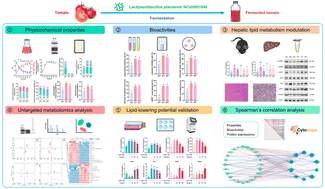Probiotic-fermented tomato with hepatic lipid metabolism modulation effects: analysis of physicochemical properties, bioactivities, and potential bioactive compounds†
Abstract
Lactiplantibacillus plantarum NCUH001046 (LP)-fermented tomatoes exhibited the potential to alleviate obesity in our previous study. This subsequent study further delves deeper into the effects of LP fermentation on the physicochemical properties, bioactivities, and hepatic lipid metabolism modulation of tomatoes, as well as the analysis of potential bioactive compounds exerting obesity-alleviating effects. Results showed that after LP fermentation, viable bacterial counts peaked at 9.11 log CFU mL−1 and sugar decreased, while organic acids, umami amino acids, total phenols, and total flavonoids increased. LP fermentation also improved the inhibition capacities of three digestive enzyme activities and Enterobacter cloacae growth, as well as antioxidant activities. Western blot results indicated that fermented tomatoes, especially live probiotic-fermented tomatoes (LFT), showed improved effects compared to unfermented tomatoes in reducing hepatic lipid accumulation by activating the AMPK signal pathway. UHPLC-Q-TOF/MS-based untargeted metabolomics analysis showed that chlorogenic acid, capsiate, tiliroside, irisflorentin, and homoeriodictyol levels increased after fermentation. Subsequent cell culture assays demonstrated that irisflorentin and homoeriodictyol reduced lipid accumulation via enhancing AMPK expression in oleic acid-induced hyperlipidemic HepG2 cells. Furthermore, Spearman's correlation analysis indicated that the five phenols were positively associated with hepatic AMPK pathway activation. Consequently, it could be inferred that the five phenols may be potential bioactive compounds in LFT to alleviate obesity and lipid metabolism disorders. In summary, these findings underscored the transformative potential of LP fermentation in enhancing the bioactive profile of tomatoes and augmenting its capacity to alleviate obesity and lipid metabolism disorders. This study furnished theoretical underpinnings for the functional investigation of probiotic-fermented plant-based foods.



 Please wait while we load your content...
Please wait while we load your content...